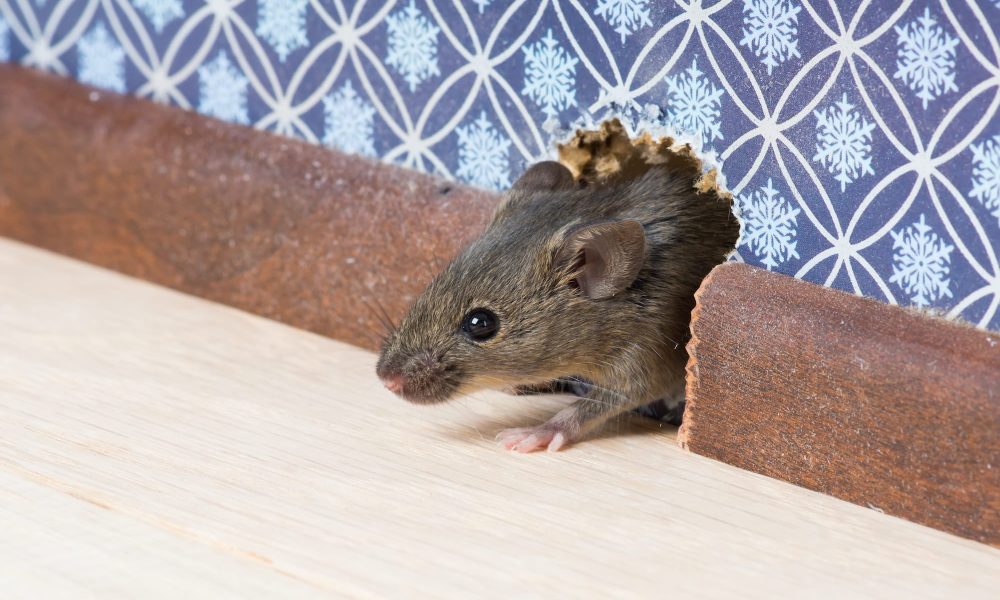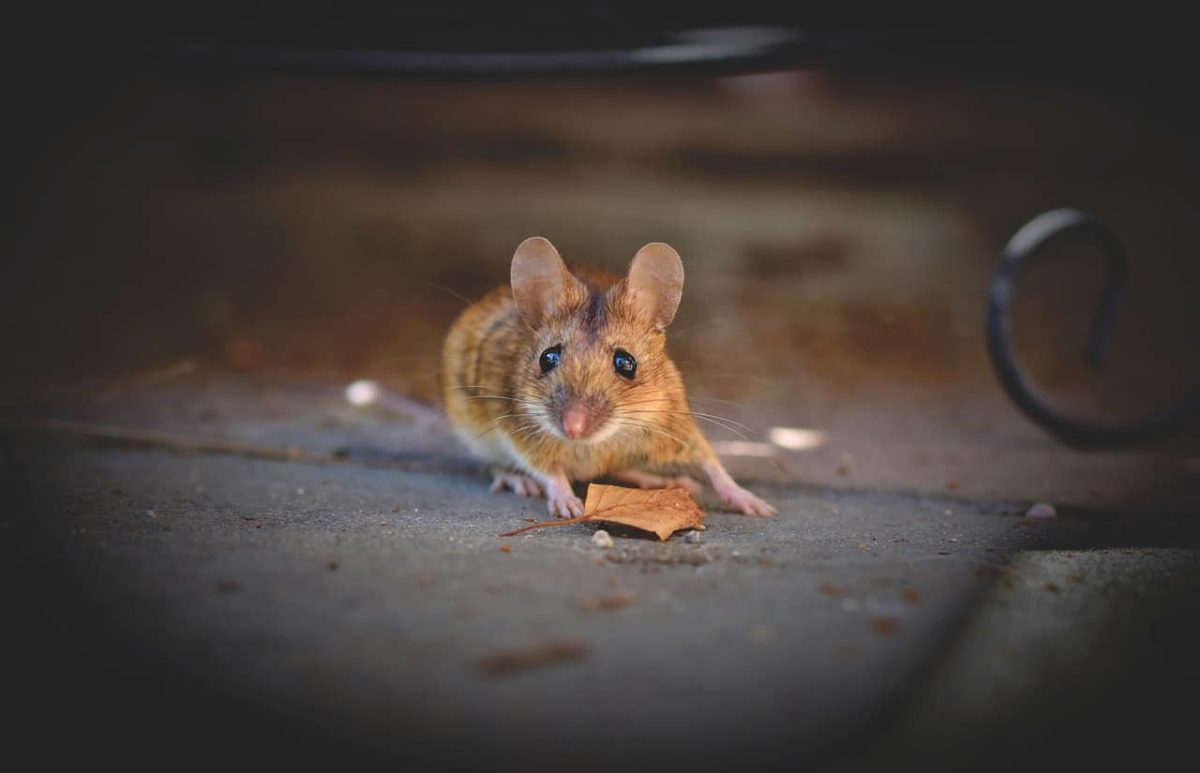
When you see a small mouse scurry across the kitchen floor, your mind might begin to race. Where did it come from? How did it get inside? Do house mice carry diseases?
The fact is yes–house mice carry disease as well as rats. Let’s talk about some of these diseases and learn about how you can prevent the spread of disease.
What types of diseases do mice carry?
Did you know that mice and rats carry over 30 different diseases? Unfortunately, many of these diseases can spread to humans. Some of the diseases that house mice carry include the following.
Salmonella
Salmonella is a type of bacteria commonly associated with food poisoning in humans, but it can also be carried by house mice. House mice carry Salmonella bacteria in their intestinal tracts and can contaminate food and surfaces in your home.
The transmission of Salmonella from mice to humans happens through contact with mouse feces or indirectly by consuming contaminated food.
Symptoms of Salmonella infection include:
- Diarrhea (which may be bloody)
- Fever
- Abdominal cramps
- Nausea
- Vomiting
- Headache
- Muscle pains
Rat-bite fever
Rat-bite fever from a mouse? Yes, it sounds strange–but it’s one of the diseases that house mice can carry. Rat-bite fever is an infectious disease that can be transmitted to humans through bites or scratches from infected rodents, including mice. The disease is primarily caused by two types of bacteria: Streptobacillus moniliformis, which is more common in North America and Europe. The other bacteria is Spirillum minus, found mostly in Asia.
Infection can also occur through contact with a rodent’s urine or mucous secretions. You can also get rat-bite fever by consuming food or water contaminated by infected rodents.
Some symptoms rat-bite fever may include:
- Fever and chills
- Muscle aches and joint pain
- Headache
- Vomiting and nausea
- Rash (usually on the hands and feet)
- Swollen lymph nodes
- Red and swollen areas around the bite or scratch (if the infection was transmitted this way)
Tapeworms
While not technically a disease, tapeworms can cause disease if they get inside your intestines.
House mice can act as carriers for these parasites. Tapeworms are transmitted to humans when they inadvertently consume foods or water contaminated with tapeworm eggs or larvae, often originating from rodent feces. This can occur in environments where house mice are present and hygiene practices are inadequate.
Once ingested, the tapeworm eggs hatch and the larvae can attach themselves to the intestinal walls, growing into adult tapeworms.
The presence of tapeworms in the intestines can lead to a range of health issues.

Symptoms may not be immediately noticeable but can include:
- Nausea and abdominal discomfort
- Weight loss and decreased appetite
- Weakness and fatigue
- Diarrhea or constipation
- Vitamin and nutrient deficiencies
Ringworm
Ringworm, despite its name, is not caused by a worm, but by a type of fungal infection. House mice can be carriers of these fungi, and they can contribute to the spread of ringworm to you.
But how can you catch ringworm from house mice? The transmission can occur through direct contact with an infected mouse or indirectly by touching surfaces or objects that have been contaminated with the fungus. This includes bedding, grooming tools, or food preparation areas where mice have been present.
The risk of ringworm increases in environments where there is a significant mouse infestation, and hygiene practices are not strictly followed.
When a human contracts ringworm from a mouse, it typically presents as a skin infection.
Symptoms of ringworm include:
- A circular, red, itchy rash that may be raised or scaly
- Patches of skin that may blister and ooze
- Bald patches on the scalp (in severe cases)
- Discoloration or darkening of the skin
Do House Mice Carry Diseases? How to Prevent Disease Transmission
Do house mice carry disease? Absolutely! But luckily you can prevent disease transmission with some extra steps.
Maintain Cleanliness and Hygiene
Regular cleaning is the first step in preventing the spread of diseases. Focus on disinfecting areas where food is prepared and stored. Regularly dispose of garbage and keep food in sealed containers.
Control and Eliminate Mouse Infestations
This is perhaps the most important step. Use traps, baits, and, if necessary, professional pest control services to reduce mouse populations in and around your property. Sealing entry points like cracks and holes can also prevent mice from entering your home.
Store Food Securely
Mice are attracted to easy food sources. Store food in airtight containers and avoid leaving leftovers or crumbs on counters or floors.
Keep Your Home Dry
Mice need water to survive, so fixing leaks and ensuring your home is dry can discourage their presence.
Use Protective Gear When Cleaning
If you are cleaning an area that has been infested by mice, wear gloves and a mask to prevent direct contact with contaminated materials.
Regularly Inspect and Clean Pet Areas
Pets can also be at risk of diseases transmitted by mice. Regularly clean and inspect areas where your pets eat, sleep, and play.
Educate Yourself and Your Family
Understanding the risks and symptoms of diseases carried by mice, such as Salmonella, Hantavirus, and tapeworms, can help in early detection and treatment.
Dispose of Waste Properly
Securely seal garbage bags and use bins with tight-fitting lids to prevent mice from accessing food scraps.
Avoid Attracting Mice with Outdoor Activities
Compost piles, bird feeders, and pet food can attract mice. Keep these as far away from your home as possible and maintain cleanliness in these areas.
Seek Professional Help When Needed
If you suspect a significant infestation or if there is a continuous presence of mice in your home, it may be necessary to consult with us at World Class Wildlife. As a pest control service, we can offer more effective and long-term solutions.
Worried About House Mice? Contact World Class Wildlife
Worried about house mice infestations? We specialize in eco-friendly and organic methods to control wildlife issues, keeping your home free from pests and the risks they bring. Contact us today to learn more!
